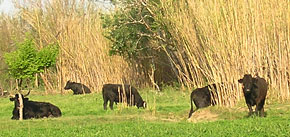Arles, so typical of the Camargue… Originally colonised by the ancient Greeks, Arles then came under Roman dominance,
in 46BC, when Caesar gifted it to his veteran legionnaires. The commune stretches out over 758 square kilometres, making it the biggest
in France. Arles is the national centre for rice-growing. Its territory covers three truly remarkable nature areas: the Camargue
(between two arms of the river Rhône, with its wildlife and vegetation protected by the 'Parc Naturel régional de
Camargue'); the Alpilles (planted with vines and olive trees) and the Crau, (a semi-deserted plateau which is home to an extraordinary
bird reserve). The whole area offers superb and varied sceneries. The world-famous Arènes d'Arles, where, during the
férias, the gardians display and fight the bulls, are the very same arenas which played host to the Roman gladiators back in
the first century! The bull is venerated here, and has been bred and lived in the marshes since antiquity. The local breed, the 'taureau
camarguais', is the true hero of the 'courses camarguaises' whilst the 'toro brava', which originates from Spain, is the breed which
fights in the arena during the corrida
What to see, what to visit: The church and cloister of Saint-Trophime; the Roman and early Christian necropolis of the
Alyscamps; the church Saint-Honorat; the Amphitheatre; the cryptoporticuses; the Abbey of Montmajour; the Museum of antique Arles
and Provence; the Réattu museum; the Museon Arlaten, the museum of the Camargue…
Available activities: 4WD safaris through the Camargue; cycling and walking circuits; the Camargue beaches are
ideal for surfing, kitesurfing and flysurfing, sailing, sea kayaking, canoeing… A visit to a manade is also a must!

